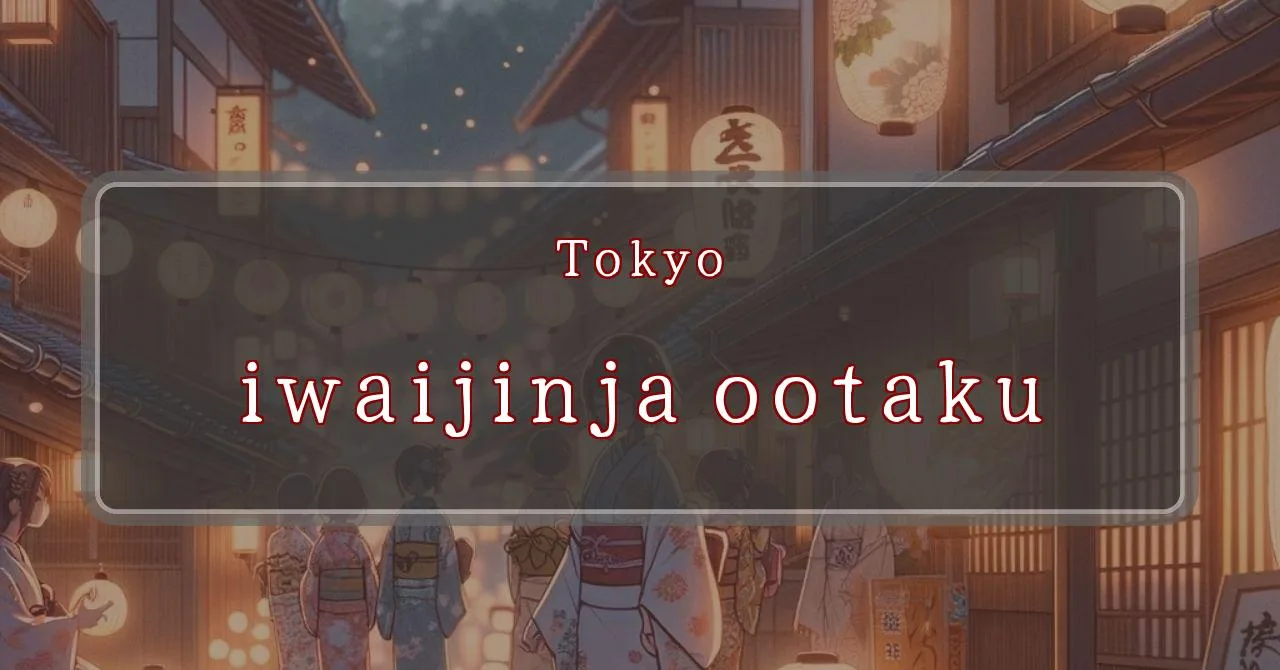Enchanting Shrine Festival in Ota City, Tokyo
Basic Information
Iwai Jinja Shrine is a Shinto shrine located in Ota City, Tokyo, Japan.
- Address: 2-20-8 Omorikita, Ota-ku, Tokyo 143-0016
- Phone Number: 03-3761-2931
- Access: 10 minutes on foot from JR Omori Station, or 3 minutes on foot from Keikyu Omorikaigan Station
- Festival Days: First Friday, Saturday, and Sunday in August
Main Events and Attractions of the Festival
The Iwai Jinja Shrine Festival is a lively and colorful event that attracts many visitors each year.
Mikoshi Procession
One of the main highlights of the festival is the mikoshi procession. A mikoshi is a portable shrine that is carried through the streets by a group of people. The mikoshi of Iwai Jinja Shrine is particularly large and impressive, and it is carried by a team of over 100 people.
Traditional Dances and Performances
During the festival, there are also a variety of traditional dances and performances. These include kagura, a sacred Shinto dance, and taiko drumming. There are also performances by local children and adults, such as singing and dancing.
Food and Games
There are also many food and game stalls at the festival. Visitors can enjoy a variety of Japanese festival foods, such as yakitori, takoyaki, and cotton candy. There are also games such as ring toss and goldfish scooping.
Fireworks Display
The festival concludes with a spectacular fireworks display. The fireworks are launched from a nearby park, and they light up the night sky with their vibrant colors.
Blessings and Deities
Iwai Jinja Shrine is dedicated to five deities: Emperor Ojin, Emperor Chuai, Empress Jingu, Princess Yamatohime-no-mikoto, and Okuninushi no Mikoto. These deities are believed to bring blessings such as good luck, prosperity, and protection from evil.
- Emperor Ojin: God of war and victory
- Emperor Chuai: God of agriculture and fertility
- Empress Jingu: Goddess of safe childbirth and maritime safety
- Princess Yamatohime-no-mikoto: Goddess of guidance and protection
- Okuninushi no Mikoto: God of marriage,縁結び (enmusubi), and good fortune
Origin and History
The origins of Iwai Jinja Shrine are unclear, but it is believed to have been founded in the 6th century. The shrine was originally located in a different part of Ota City, but it was moved to its current location in 1664.
- Founded: 6th century
- Moved to current location: 1664
Tips and Notes for Visitors
Here are some tips and notes for visitors to Iwai Jinja Shrine:
- The shrine is open daily from 9:00 AM to 5:00 PM.
- Admission is free.
- The festival is held annually on the first Friday, Saturday, and Sunday in August.
- During the festival, there are a variety of events and activities, including a mikoshi procession, traditional dances and performances, food and games, and a fireworks display.
Parking Information
There is a small parking lot at Iwai Jinja Shrine, but it is often full during the festival. There are also several public parking lots in the area.
- Iwai Jinja Shrine parking lot: Small, often full during festival
- Public parking lots: Several in the area
Popular Stalls and Food Carts in Recent Years
| Type of Stall | Description |
|---|---|
| Takoyaki | A staple at Japanese festivals. Characterized by a crispy outside and a creamy inside. |
| Jaga Butter | A simple yet popular snack of hot potatoes lavishly topped with melted butter. |
| Baby Castella | Small castella cakes, sweet and fluffy treats enjoyed by children and adults alike. |
| Grilled Ayu with Salt | Fresh ayu fish grilled whole with salt, a savory taste of Japanese summer. |
| Shaapin | A unique gourmet item influenced by foreign cuisine, with a chewy skin wrapping the filling. |
| Okonomiyaki | A Japanese grilled dish where you often choose your own ingredients for a personalized flavor. |
| Cotton Candy | A fluffy, sweet snack that’s extremely popular with children. |
| Chocolate Banana | A banana coated in chocolate, a fun and visually appealing dessert. |
| Kushiyaki | Various types of ingredients skewered and grilled, an easy-to-enjoy snack. |
| Yakisoba | Fried noodles mixed with a special sauce, a fast food favorite in Japan. |



